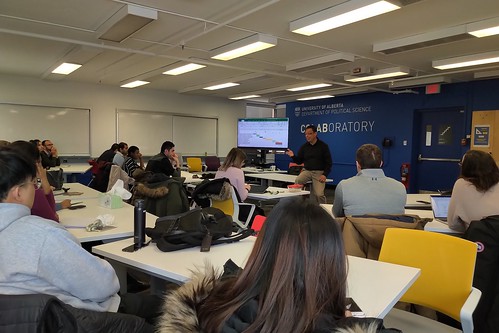I am lucky that I am not teaching this semester, given how COVID-19 has thrown everything into disarray for so many scholars around the world. Not teaching during the first semester of the year is actually normal for me, and I recognize my huge privilege to be able to do this type of scheduling. For the past few years, I have moved all my teaching to the fall so that I can do fieldwork and academic conferences during the spring. Obviously, sometimes, students request my courses and therefore I have them added on to my spring schedule, something that forces me to rethink my fieldwork and travel season. Anyway, I was thinking about the importance of infrastructure now that we have been forced to do emergency remote teaching and learning.

My tweet summarizes my concern:
I just reflected on one thing: when we teach on campus we use our university’s own infrastructure. Working remotely forces us to pay for and maintain our own digital infrastructure. Students have to do this too.
— Dr Raul Pacheco-Vega (@raulpacheco) March 29, 2020
Universities (and other learning organizations) thus have a democratizing and equalizing function: they provide infrastructure (computers, internet, library books/space) for EVERYONE. Being forced to go remote, we also forget structural inequalities across the student body and faculty. I remember one time, when a project officer for the Konrad Adenauer Stiftung told me “please have everyone participating in your workshop scan their IDs and send them to me”. What makes you (this project officer) think EVERYONE has a scanner/printer/robust wifi to scan-to-PDF and send? Jesus.
I shared a couple of anecdotes from when my Mom did her PhD at the Universidad Complutense de Madrid, in Spain. When Mom was doing her doctorate in Madrid, she often times had to go work late at their local “locutorio” (a computer lab where computers and internet were available to rent). Simply because she didn’t have wifi at home to send her homework. Terrible.
Another anecdote from that epoch. Mom did her PhD in Spain (Madrid, Complutense) at the same time I was doing mine in Canada (Vancouver, UBC), and my oldest brother was doing his in the US (South Bend, Notre Dame). She had a laptop, and worked from her “piso” (apartment). one time, she was finishing a paper for a class late at night, and before she could save it to a USB her laptop died.
At 1 am.
She had to leave her house and go to a “locutorio” and rewrite her f****ng paper FROM SCRATCH. Mom had to walk alone through the streets of Madrid at 1 am so she could find a locutorio that would be open so she could rewrite her paper. She found one and rewrote the damn paper from scratch. She finished at 8 am, having had zero sleep, sent it out, printed it and then walked home, showered, went to class on zero hours of sleep. So yeah, am I very sensitive to students and staff and faculty’s disparities in technology and infrastructure? Absolutely.
My Mom’s experiences really reminded me of how stark these infrastructure inequities are.
The point of this blog post and my original tweet is to remind ourselves of two interrelated issues:
1) There is enormous heterogeneity in personal infrastructure for online learning and teaching. When we have to move our teaching to online platforms, we rely on OUR infrastructure including computer equipment and internet access, and we may not have the most ideal. Our students may have limited online access or no computing equipment. We MUST take into account these challenges they may face. This is also true for faculty AND staff.
2) My point wasn’t a critique of universities, but more of the governance of higher education system itself. Universities play a democratizing role by providing infrastructure. Governments should properly fund universities, colleges and schools so that they can pass on infrastructure improvements, subsidies and support to their students and faculty.
Anyway, challenging times ahead, and the discussion that arose from my tweet is extraordinarily enlightening. I encourage you to read my Twitter thread and responses to it, including quote tweets.

0 Responses
Stay in touch with the conversation, subscribe to the RSS feed for comments on this post.